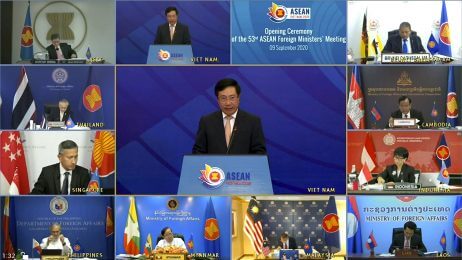After a one month delay, the Association of Southeast Asian Nations (ASEAN) held its annual ministerial meetings, with Vietnam acting as the chair in a virtual conference.
The ASEAN ministers voiced their concerns regarding the growing number of coronavirus cases in the region and called for regional cooperation. One unnamed, senior diplomat who attended the meeting said, “A key project is establishing a COVID-19 response fund to help ASEAN member states buy medical supplies and protective suits.” To this effect, ASEAN partners pledged in excess of $1 million.
During the opening ceremony, Vietnamese Prime Minister Nguyen Xuan Phuc called for “regional solidarity amid the headwinds”, referring to the pandemic, rising tensions in the South China Sea (SCS), and the growing rivalry between the United States (US) and China. The SCS dispute was one of the principal focuses of the meeting, due to the recent increase in China’s military exercises in the region coupled with a shift in the US policy.
Recently, cementing Washington’s commitment to SCS arbitration, US Secretary of State Mike Pompeo revised the nation’s position by detailing the US position on specific SCS disputes, including the Scarborough Reef and the Spratly Islands, and unlike in the past, affirmed its support to Vietnam. Ratcheting pressure on Beijing, the US imposed sanctions on 24 state-owned Chinese companies that allegedly participated in building artificial islands in the SCS.
At the regional level, the SCS has been a thorny issue between China and the littoral states—Vietnam, Philippines, Indonesia, Brunei, and Malaysia. Regarding the discussion on territorial disputes, the ASEAN ministers, in a draft communique, said that “some ministers expressed concerns on the land reclamations, activities and serious incidents in the area which have eroded trust and confidence, increased tensions and may undermine peace, security, and stability in the region.”
At the virtual meeting, Chinese Foreign Minister Wang Yi said that the US was the “biggest driver of militarisation of the South China Sea” and “most dangerous factor damaging peace” in the region. He further accused the US of “undermining” China’s efforts to negotiate with ASEAN states. Last month, China initiated several high-level meetings with ASEAN members to work together to resolve the SCS dispute. A Chinese official said that the littoral states should resume negotiations on the code of conduct pertaining to the conflict “as soon as possible.”
The Chinese foreign minister further noted that the US sent “3000 sorties of military aircraft and over 60 warships” to the SCS in the first half of the year, positing that the US was intervening in territorial disputes and strengthening its military deployment in the contested area “out of its own political purposes.” Pompeo, in turn, asked ASEAN “to go beyond words and act against China’s bullying”, promising that the US will back them up.
Individual Southeast Asian nations voiced their support for Washington’s role in the area. Voicing support for the US, Vietnam’s Foreign Minister Pham Binh Minh said, “We welcome the US’s constructive and responsive contributions to ASEAN’s efforts to maintaining the peace, stability, and developments in the South China Sea.” In recent weeks, the Philippines has walked the tightrope in balancing its policies between Washington and Beijing, as the two superpowers compete for influence in the region. The Philippines’ new armed forces chief, General Gilbert Gapay, reiterated the importance of defence ties with the US, as the country continues to cosy up to China by initiating strategic infrastructure projects. Gapay said, “While our ties with China are warming up, it doesn’t mean we are abandoning our ties with the United States and other traditional allies, we are maintaining all these ties with allied countries.”
ASEAN Ministers Discuss Coronavirus, SCS Disputes, and US-China Rivalry
The South China Sea was one of the principal focuses of the meeting, given that the region impacts six-member nations.
September 11, 2020

ASEAN foreign ministers watching Vietnamese Foreign Minister Pham Binh Minh (center) deliver a speech during the opening of the ASEAN Foreign Ministers Meeting, 9 September 2020. SOURCE: VTV VIA AP
